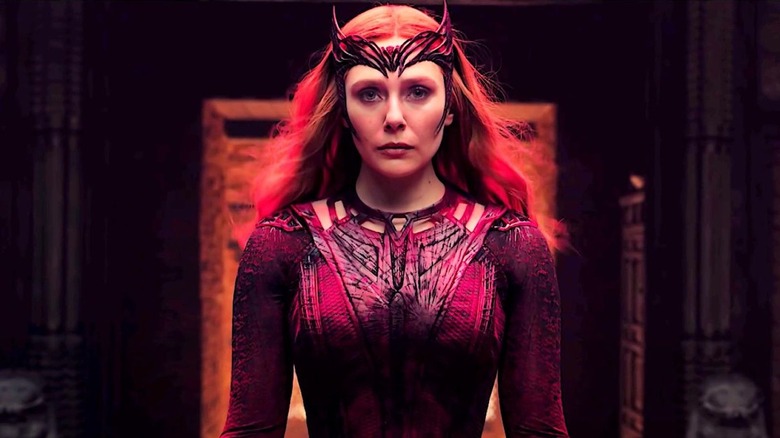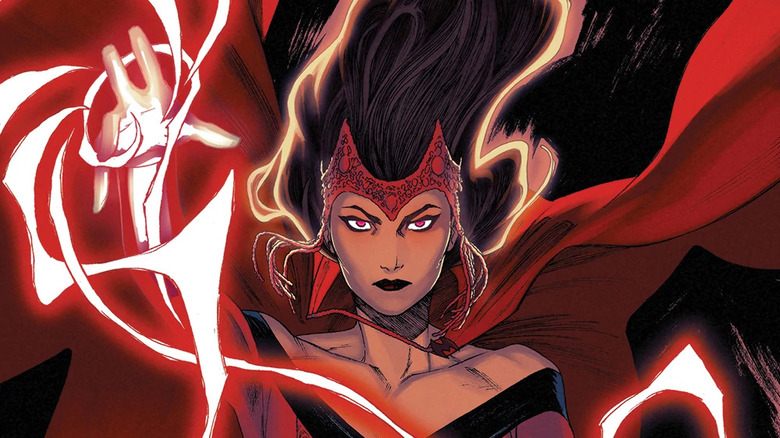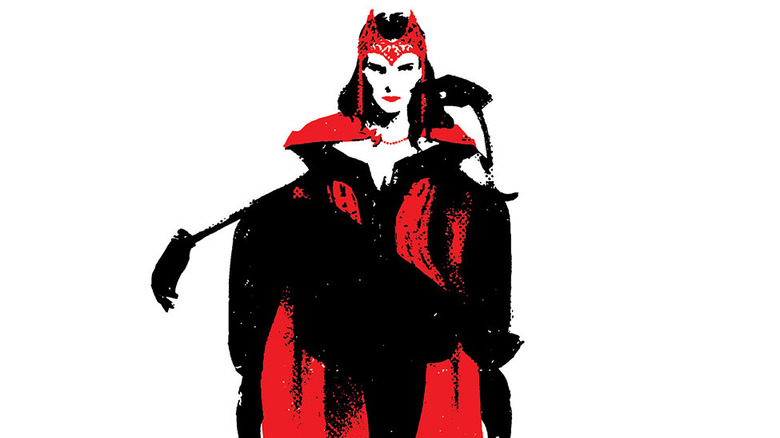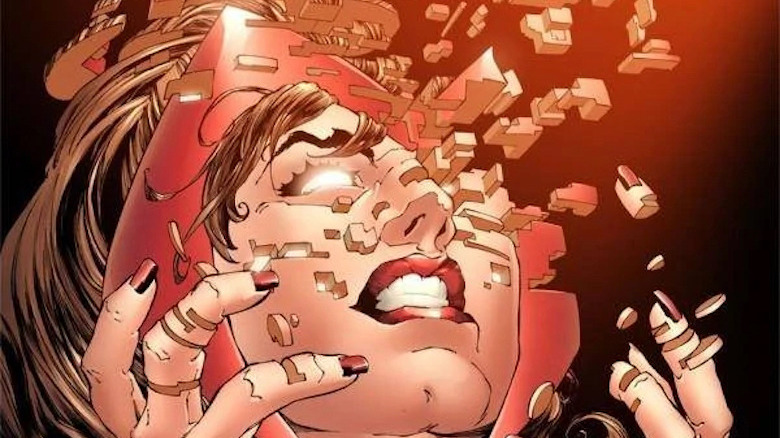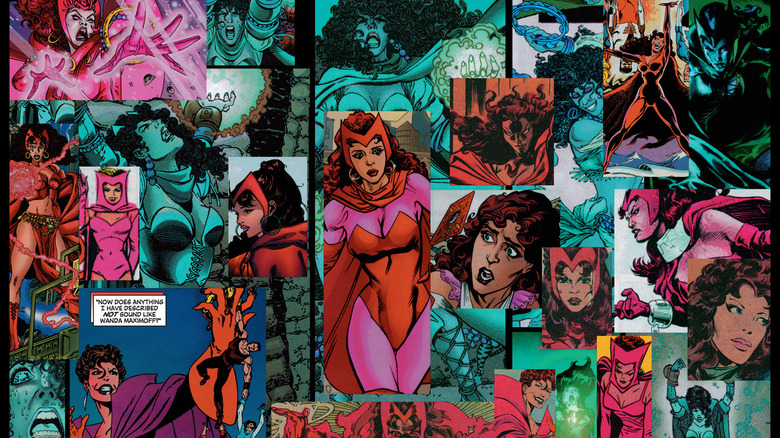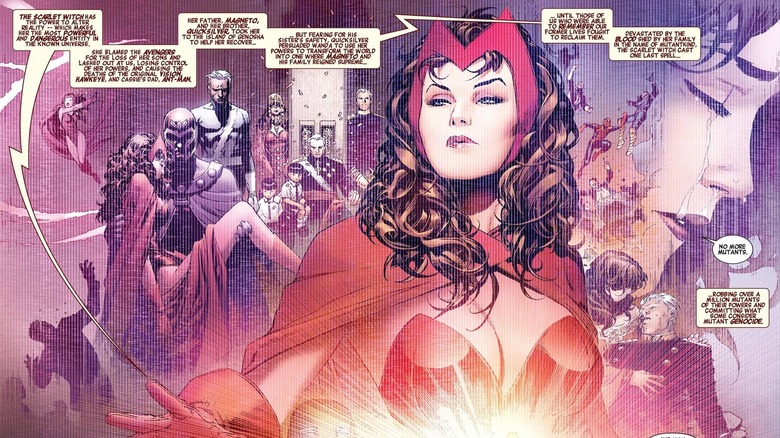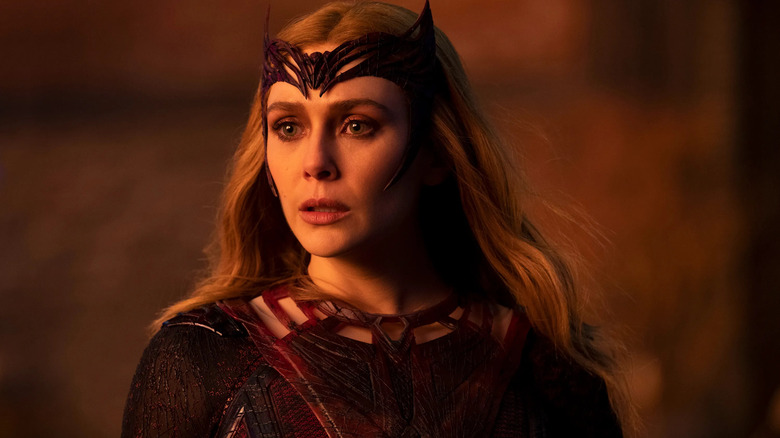Doctor Strange In The Multiverse Of Madness Repeats Marvel Comics' Worst Scarlet Witch Mistakes
There is a lot to love about "Doctor Strange in the Multiverse of Madness." Sam Raimi brought something truly unique to the Marvel Cinematic Universe and those elements were intensified by Danny Elfman's incredible score. Seriously, how fun was that music fight? However, the film has proven divisive, and honestly, I get it.
Despite how much I enjoyed parts of this movie, I still left the theater with an overwhelming feeling of disappointment. It's not because the film made Wanda a villain or even the fact that it all but ignores the brilliant character work laid out in "WandaVision" — though that's certainly there. In this case, my frustration with the MCU is how closely it chose to stick to the source material.
Being used as a plot device with little agency is nothing new for Wanda Maximoff. The hero has had a complicated comics history for decades. I could've handled a heel turn from Scarlet Witch had it felt earned. What I find to be a true letdown is watching a comics character who was seemingly reinvented with "WandaVision" once again reduced to the trope of a hysterical woman who can't handle her power and goes off the deep end because ... motherhood.
While the Disney+ show delved deeply into Wanda's trauma and grief, her portrayal in "Doctor Strange in the Multiverse of Madness" feels paper thin. Hand wave and blame the influence of the Darkhold all you want, but the truth is, this idea has grown stale. Yes, the film draws heavily from comics lore, but — and I say this as a huge comics fan — that's not always a good thing. Scarlet Witch has been failed repeatedly by comics over the years and rather than update source material that hasn't necessarily aged well, the newest "Doctor Strange" movie simply doubles down on those mistakes.
Hero or villain?
Many of the Scarlet Witch's stories are a product of their time. Obviously, comics from previous decades, even as late as the early aughts read quite differently in 2022 than they did at the time they were published. My issue isn't with Wanda becoming Marvel Comics' Big Bad. I love seeing complex female villains. It's the fact that she's constantly manipulated, has little to no agency even in the stories that supposedly center on her, and that motherhood is generally the driving force behind her villainy. We see Wanda wreak plenty of havoc in the comics, but are rarely given any real insight into her state of mind.
The Scarlet Witch has had a rough time throughout her Marvel Comics history. Created in 1964 by Jack Kirby and Stan Lee, Wanda Maximoff debuted in "X-Men" #4. Much like her introduction in the Marvel Cinematic Universe, Scarlet Witch began her comics journey as a villain. She and her brother Pietro were members of the Brotherhood of Evil Mutants, though Wanda was really only fighting for Magneto because she felt she owed her life to him. However, it didn't take long before both Scarlet Witch and Quicksilver became bonafide Avengers. Scarlet Witch would remain a hero for quite some time, until Marvel decided she wasn't.
Wanda has been many things throughout her existence and her history has been retconned enough times to make your head hurt. She has played both hero and villain, though her time as the former has definitely outweighed her experience as the latter. Still, Wanda rarely had any semblance of control over her own life. Whether she is possessed by Chthon, manipulated by Immortus, or tricked by Doctor Doom, the Scarlet Witch's worst actions are pretty much never her fault.
Who is Wanda?
Scarlet Witch's history is confusing and her origin has been rewritten quite a few times. Likely due in large part to the bad blood between Marvel and Fox, it was revealed years ago that not only was Magneto not her father, but that Wanda wasn't actually a mutant. Both of these things had been central to the character for decades — though you could argue that Magneto being her dad was a retcon in the first place.
Wanda's power set is perplexing too. What began as "hex powers," or the ability to alter probabilities, was eventually combined with a proficiency in magic, which later led to full-on reality warping, making Wanda one of the most powerful beings in Marvel Comics. While even more retcons have explained these power-ups, Wanda has often struggled with her tremendous abilities. The portrayal of her mental health has been flawed to say the least.
I'm sure those writing Wanda Maximoff throughout her history had no intention of miring her stories in misogyny. In fact, scribes like Steve Englehart had fought for Wanda to be so much more. He told The Comics Journal:
"When I took over "Avengers," I was told that Wanda was supposed to do one hex and then be too tired to keep going. I thought to myself, 'She's a damn Avenger, isn't she?' and deliberately set out to make her stronger. It could be that that decision drove all my strong women afterward. She got to be very strong, and at the same time, she was always very loving toward the Vision. She and he were the linchpins of a lot of my Avengers, the ones we followed while everyone else had more short-lived arcs, and they got married and then had kids – the greatest Marvel couple."
Wanda's descent into madness
Of course, Englehart's work was undone not long after he left "West Coast Avengers." Vision was destroyed and rebuilt into an unrecognizable version of himself, and it turned out Wanda had willed Billy and Tommy into existence. This would cause the Scarlet Witch to snap on her teammates; though, as it later turns out, she had no real control, as many of these events were shown to be orchestrated by Immortus.
Wanda's greatest turn as a villain is inarguably from "Avengers: Disassembled," into "House of M." It's been close to 20 years since Brian Michael Bendis began the story (the former has art from David Finch and the latter from Olivier Coipel) and Scarlet Witch has barely escaped its shadow. Despite the fact that Wanda had played the villain multiple times before, her major powers upgrade, as well as her rapidly deteriorating mental state, kind of come out of nowhere. This turn is the result of events that happened more than a decade earlier and there hadn't been much exploration of that trauma since. Janet (aka Wasp) mentions the kids and Wanda loses it immediately.
"House of M" is considered by many to be a core Scarlet Witch tale, but it's mostly a Wolverine story. Wanda is little more than a plot device on which everything can be blamed in both the Avengers arc and the major Marvel event. In "House of M," Wanda remakes the entire world, and not only is she barely in the story, but it's revealed her brother Pietro was the one pulling her strings all along. Don't get me wrong, I think "House of M" is an absorbing read. It just isn't really about Wanda at all. Once again, she is barely a supporting character in a narrative that hinges on her actions.
What we see versus what we get
I'm not suggesting that the inexorable pull of grief couldn't chip away at one's sanity. What I am saying is that Wanda's twist doesn't feel earned in "Chaos" (the main arc of "Avengers: Disassembled") anymore than it does in "Doctor Strange in the Multiverse of Madness." Wanda had suffered so much in the comics, having lost her husband and her children. On top of that, being possessed multiple times and having your mind constantly manipulated by villains would take its toll. Not to mention, Wanda's memories of her kids were totally wiped by Agatha Harkness.
Wanda's villainous turn in the new "Doctor Strange" movie is even more egregious, considering the way "WandaVision" left things. Perhaps if we'd had another movie or show in which Marvel had chosen to explore Wanda's mindset further, rather than going straight from the Disney+ series into the new film, the story would've had room to breathe.
Wanda made the decision to release the town of Westview. She knowingly chose to give up Vision, as well as Billy and Tommy. We do see her with the Darkhold at the end of the series and it seems as though she was alone for quite a while — seriously, no one could've checked up on her? However, if "WandaVision" made me believe the MCU was capable of elevating the source material, "Doctor Strange in the Multiverse of Madness" caused me to wonder if any of this so-called interconnected storytelling even matters.
Can Wanda be saved?
I don't believe that only women can be trusted with our own stories, but it is telling that "WandaVision" had a diverse writers room largely populated by women. I know the screenplay for "Multiverse of Madness" wasn't written in a vacuum and I really enjoyed screenwriter Michael Waldron's work on "Loki." This is not meant to disparage the movie, because it obviously has great moments as well. However, while "WandaVision" brought me to tears, the "Doctor Strange" sequel didn't resonate with me on an emotional level. Plus, don't even get me started on how the movie treated another one of my favorite female characters, America Chavez.
I can handle Wanda as a villain, but a one-note villain? How did she reach this point? Sure, she's seen using the Darkhold, but that in no way indicates she's going to go on a killing spree in which she indiscriminately murders heroes all in service of sacrificing not only a child for her own happiness, but also another version of herself. Also, it's worth noting that Billy and Tommy are safe and content in these other universes. Of course, Wanda misses them more than a lost limb, but we're given very little insight into her motivations. It's fun watching her kill every member of the Illuminati while barely breaking a sweat, as long as I don't think too deeply about why she's doing it.
Elizabeth Olsen is excellent as always and while she brings as much depth to the performance as she can, something still feels off. Just like her comics counterpart, Wanda isn't in full control of her actions. Perhaps this is to make it easier to walk back the damage she does later. I just would've loved to see a true progression of how we got here.
Marvel doesn't have to repeat the comics' mistakes
I've loved the Scarlet Witch for a long time. I even dressed up as her for Halloween back in 2014. She's a fascinating character and it's great that more recent stories, like James Robinson's run (which includes amazing artists such as the late Steve Dillon) have tried to better illustrate that. One particularly exceptional story is Allan Heinberg and Jim Cheung's "Avengers: The Children's Crusade," which reunites Wanda with her long lost sons. Once again, Scarlet Witch is something of a pawn, but she finally makes her own decisions. Plus, anything with the Young Avengers is automatically awesome.
MCU Wanda has experienced immeasurable trauma just like her comic counterpart. However, rather than confronting her loss of Vision or Quicksilver in this movie, we're given little beyond, "I'm not a monster, Stephen. I'm a mother." Wanda also brings up how Stephen's actions mirror her own and yet only one of them is labeled a villain. This is true, but are were really given any reason in this movie to see Wanda as anything else?
Look, I adore the MCU and definitely do not think "Doctor Strange in the Multiverse of Madness" is a bad movie. It's just that Marvel had the opportunity to make Wanda a compelling villain and instead they took their cues from the comics and had her snap in an instant with no exploration of her own perspective. Elizabeth Olsen showed astounding range in her "WandaVision" performance. It's a shame Marvel's next step was to bring Wanda back around to being a tired trope. Hopefully, Olsen's not done in the MCU and the studio can find a way to rewrite Scarlet Witch's story. After all, what are comics without retcons?
